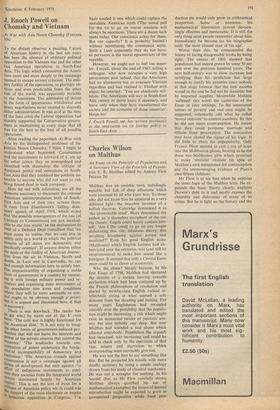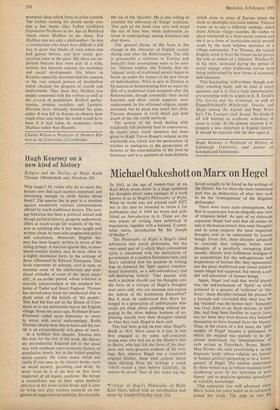Charles Wilson on Malthus
An Essay on the Principle of Population and A Summary View of the Principle of Popula- tion T. R. Malthus edited by Antony Flew Pelican 7s)
Malthus was an amiable man, unfailingly equable but full of deep affections which were returned by all who knew him. To those who did not know him he appeared in a very different light—the macabre inventor of a hellish doctrine. Coleridge denounced it as 'the abominable tenet'. Marx denounced the author as 'a shameless sycophant of the rul- ing classes'. Engels could barely contain him- self; 'Am I [he cried] to go on any longer elaborating this vile, infamous theory, this revolting blasphemy against nature and mankind?' Even his good English name (Malthouse) which English laziness had ab- breviated over the centuries, was (and still is) mispronounced to make him sound like a foreigner. It seemed that only a Central Euro- pean could be so clever at economics.
Why the abuse? Simply because, by his first Essay of 1798, Malthus had shattered the dreams of a society moving towards perfection which had been conjured up by the French philosophers of revolution and shared by middle-class English radical in- tellectuals sitting at what seemed a safe distance from the shooting and looting. For many years Englishmen had wrangled amiably over the possibility that the popula- tion might be decreasing, a risk which might raise an occasional twitter of patriotic anx- iety but cost nobody any sleep. But now Malthus had sounded a real alarm which affected everybody. Population (he argued) had increased, was increasing and could be held in check only by the operation of that vice, misery and starvation to which overcrowding must inevitably give rise.
He was not the first to say something like this. But he projected his missile with more deadly accuracy by using a simple analogy drawn from his study of classical mechanics. He was not a wrangler for nothing. In his 'model' (for, as Mr Flew carefully shows, Malthus always qualified his use of mathematical examples) the forces of human reproduction might be expected to grow in geometrical proportion while food pro-
duction etc would only grow in arithmetical proportion. Sense or nonsense, his mathematical illustration proved devasta- tingly effective and memorable. It is still the only thing most people remember about him. Immediately he became (as his biographer said) .'the most abused man of his age'.
Worse than this, he compounded the felony of facing disagreeable truths by being right. The census of 1801 showed that population had indeed grown by some 50 per cent over the previous hundred years. The next half-century was to show increases less terrifying than his prediction but large enough to justify his anxieties since nobody at that stage foresaw that the new mouths would in the end be fed not by domestic but by imported supplies. Meanwhile Malthus 'softened' (his word) the austerities of the Essay in later writings. To the impersonal terrors of poverty and vice men might, he suggested, voluntarily add what he called 'moral restraint' to control numbers. By this he did not mean contraception. He meant that they could postpone marriage and refrain from procreation. The concession may have abated the rigour of his logic. It did little to abate his unpopularity. Only Francis Place seemed to cast a ray of hope into the Malthusian gloom, bearing as he did those neo-Malthusian gifts which promised to make 'restraint' realistic (in spite of Malthus's own repugnance for contraception and the unencouraging evidence of Place's own fifteen children).
Mr Flew is at his best when he explains the inner logic of the Malthus texts. He ex- pounds the basic theory clearly, explains Darwin's debt to it and neatly exposes the absurdity and dishonesty of many of its critics. But he is light on the history and the economic ideas which form its wider context. The further reading list should surely con- tain a few books (like Talbot Griffiths's Population Problems in the Age of Malthus) which relate Malthus to his times. For Malthus was not only a philosopher : he was a countryman who knew how difficult it still was to grow two blades of corn where one had grown before, and how easily pro- creation came to the poor. His ideas are im- portant because they were part of a wide, realistic but humane concern for economic and social development. His letters to Ricardo especially demonstrated his concern at the vast unused ,powers of production which checked the progress of wealth and employment. They show that Malthus was deeply concerned with the welfare as well as the growth of population. Radical perfec- tionists, utopian socialists and Leninist- Marxists have viciously distorted his prin- ciples. It was left to Keynes to observe how much wiser and richer the world would have been if it had taken its economics from Malthus rather than Ricardo.
Charles Wilson is Professor of Modern His- tory at the University of Cambridge.



































 Previous page
Previous page